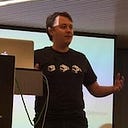Yes, I know the fine print, but in this case, the objective was to know whether it works or not beforehand.
So, which is the full chain of though here? Turing showed the halt problem, and that we cannot determine whether a program stops or not. And now assume that we want to determine if a program works or not as expected, if it works as expected, it will execute and will stop when it finishes. But it turns out that we cannot know if it stops or not, if we cannot know if it stops, the assumption that we can determine if a program works or not as expected is false. Therefore, Turing also showed that we cannot determine if a program works.
And because I didn't want to bother the non-technical audience with details about Turing demonstrations, I directly went for the conclusion.
